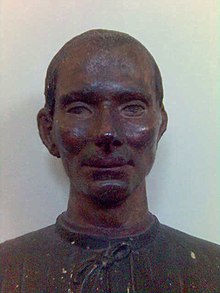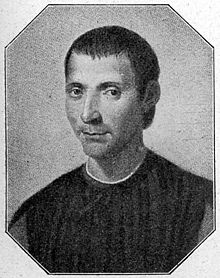Niccolò Machiavelli
Appearance

Niccolò Machiavelli (May 3, 1469 – June 21, 1527) was a Florentine political philosopher, historian, musician, poet, and playwright. Machiavelli was also an important person in the realist political theory which was important in European politics in the Renaissance.[1][2]
Sourced quotes
The Prince (1513)
- Original Italian title: Il Principe (written about 1505)
- "Upon this, one has to remark that men ought either to be well treated or crushed, because they can avenge themselves of lighter injuries, of more serious ones they cannot; therefore the injury that is to be done to a man ought to be of such a kind that one does not stand in fear of revenge."
- Simple: A man who has a small injury will want revenge, yet a man who is dead will not. Therefore it is better to do a big injury to someone than a small one.
- About the quote: Chapter 3; Also translated: Never do an enemy a small injury.
- "If someone puts up the argument that King Louis gave the Romagna to Pope Alexander, and the kingdom of Naples to Spain, in order to avoid a war, I would answer as I did before: that you should never let things get out of hand in order to avoid war. You don't avoid such a war, you merely postpone it, to your own disadvantage."
- Simple: You should not give away too much of what you own to avoid a war, as it will only push it back in time, and when it does come you will be in an even worse position.
- About the quote: Chapter 3 (as translated by RM Adams).
- "It ought to be remembered that there is nothing more difficult to take in hand, more perilous to conduct, or more uncertain in its success, than to take the lead in the introduction of a new order of things. Because the innovator has for enemies all those who have done well under the old conditions, and lukewarm defenders in those who may do well under the new. This coolness arises partly from fear of the opponents, who have the laws on their side, and partly from the incredulity of men, who do not readily believe in new things until they have had a long experience of them."
- Simple: There is nothing harder then to try and make a new idea become popular, as you will have strong opponents in those that are benefiting from the old idea, but only weak allies in those that might benefit from the new idea in the future.
- About the quote: Chapter 6

- "From this arises the question whether it is better to be loved rather than feared, or feared rather than loved. It might perhaps be answered that we should wish to be both: but since love and fear can hardly exist together, if we must choose between them, it is far safer to be feared than loved."
- About the quote: Chapter 8
- "A prince ought to have no other aim or thought, nor select anything else for his study, than war and its rules and discipline; for this is the sole art that belongs to him who rules, and it is of such force that it not only upholds those who are born princes, but it often enables men to rise from a private station to that rank. And, on the contrary, it is seen that when princes have thought more of ease than of arms they have lost their states. And the first cause of your losing it is to neglect this art; and what enables you to acquire a state is to be master of the art."
- Simple: A prince should only try and study war and it's organization and discipline above all else, for that is what is truly needed.
- About the quote: Chapter 14; Variant: A prince should therefore have no other aim or thought, nor take up any other thing for his study but war and it organization and discipline, for that is the only art that is necessary to one who commands.
- "Among other evils which being unarmed brings you, it causes you to be despised."
- Simple: Being weak will make you disliked, among other evils.
- About the quote: Chapter 14
- "A prince being thus obliged to know well how to act as a beast must imitate the fox and the lion, for the lion cannot protect himself from traps, and the fox cannot defend himself from wolves. One must therefore be a fox to recognize traps, and a lion to frighten wolves."
- Simple: A prince must be able to be both clever and fierce. One must be more than one dimensional in politics.
- About the quote: Chapter 17
- "You must know there are two ways of contesting, the one by the law, the other by force; the first method is proper to men, the second to beasts; but because the first is frequently not sufficient, it is necessary to have recourse to the second."
- Simple: There are two ways of fighting, by law, and by force. The first is proper to men, the second to beasts; but the first often will not work, you must be ready to go to the second.
- About the quote: Chapter 18
- "A prince never lacks legitimate reasons to break his promise."
- Simple: A prince can always find a good reason to break his promise.
- About the quote: Chapter 18
- "The first opinion which one forms of a prince, and of his understanding, is by observing the men he has around him; and when they are capable and faithful he may always be considered wise, because he has known how to recognize the capable and to keep them faithful. But when they are otherwise one cannot form a good opinion of him, for the prime error which he made was in choosing them."
- Simple: The first and most important way to assess a ruler is to look at those he has around him. If they are capable and trustworthy then he is wise, but if not then it is impossible to form a good opinion of him.
- About the quote: Chapter 22 (as tranlsated by W. K. Marriott). Also translated: The first method for estimating the intelligence of a ruler is to look at the men he has around him.
- "There is no other way of guarding oneself against flattery than by letting men understand that they will not offend you by speaking the truth; but when everyone can tell you the truth, you lose their respect."
- About the quote: Chapter 23
- "Where the willingness is great, the difficulties cannot be great."
- Simple: Where people really want to do something, it cannot be very hard to do.
- About the quote: Chapter 26
Discourses on Livy (1517)
- Quotes from translations of Discorsi sopra la prima deca di Tito Livio; 3 vols. published between 1512–1517 (Discourses on the First Ten Books of Titus Livius)
- "Men never do good unless necessity drives them to it; but when they are free to choose and can do just as they please, confusion and disorder become rampant."
- Simple: Men will only do good if they are forced to by need; but when they are free to do as they want, confusion and disorder become common.
- About the quote: Book 1, Chapter 3 (as translated by L.J. Walker & B. Crick)

- "So in all human affairs one notices, if one examines them closely, that it is impossible to remove one inconvenience without another emerging."
- Simple: In human affairs, you cannot remove one problem, without another being created.
- About the quote: Book 1, Chapter 6 (as translated by LJ Walker & B Crick)
- "Anyone who studies present and ancient affairs will easily see how in all cities and all peoples there still exist, and have always existed, the same desires and passions. Thus, it is an easy matter for him who carefully examines past events to foresee future events in a republic and to apply the remedies employed by the ancients, or, if old remedies cannot be found, to devise new ones based upon the similarity of the events. But since these matters are neglected or not understood by those who read, or, if understood, remain unknown to those who govern, the result is that the same problems always exist in every era."
- Simple: Anyone who studies the past republics will see the same wants and passions. Therefore it is easy for one who carefully looks at past events to foresee future events in a republic, and to apply the same cures, or to make new ones. But since this is not paid attention to, or understood, the result is the same problems that exist in every age.
- About the quote: Book 1, Chapter 39
The Art of War (1520)
- Quotations from translations of Dell'arte della guerra ; also known as On the Art of War
- "No proceeding is better than that which you have concealed from the enemy until the time you have executed it. To know how to recognize an opportunity in war, and take it, benefits you more than anything else."
- Simple: Nothing works better than that which you keep hidden until you do it. To know how to see oppurtunity in war, and act on it, will help you more than anything else.
- About the quote: Book 1
- "Nature creates few men brave, industry and training makes many. Discipline in war counts more than fury."
- Simple: Few men are born brave, but training can make them brave, and in war discipline and order is worth more than fury.
- About the quote: Book 7
References
- ↑ White, Michael (2007). Machiavelli, A Man Misunderstood. Abacus. ISBN 978-0-349-11599-3.
- ↑ S. Anglo, Machiavelli: the first century (Oxford, 2005)
Other websites
 Niccolò Machiavelli on Wikipedia
Niccolò Machiavelli on Wikipedia Works by Niccolò Machiavelli on the English Wikisource
Works by Niccolò Machiavelli on the English Wikisource- Selected Works of Machiavelli in different formats
- Machiavelli at Project Gutenberg
- Machiavelli as He Is in the Works of Francis Bacon


